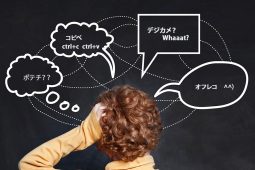Business language in English is famous for its overly complex jargon which though intended to impress the listener, often leaves people scratching their heads. The situation is similar in Japan, but an interesting point is that many popular Japanese business buzzwords have been adapted from the English language. Such katakana terms are frequently used in business meetings to replace native Japanese equivalents and though rooted in English, they can be difficult to recognize when you first hear them. Here are a few of the more popular terms with usage examples.
1. アグリー (agurii) can mean “agree” or “approve”.
Example: 「会議でアグリーされたからと言って、安心するのはまだ早い。」
“Just because people agreed with you in the meeting, doesn’t mean you can relax yet.”
2. エスカレーション (esukareeshon) is derived from the English “escalation”, but in Japanese it means “to report something to a superior”.
Example: 「内容が決まり次第、上司へエスカレーションしてください。」
“As the details are decided, please report them to your boss.”
3. MTG or エムティージー (emutiijii) is an abbreviation for “meeting” and means simply that.
Example: 「このMTGの目的は何ですか?」
“What is the purpose of this meeting? ”
4. オンスケ (onsuke) is an abbreviation of the English “on schedule”.
Example: 「先日の案件ですが、オンスケでいきます」
“About that matter of the other day — let’s keep it on schedule.”
5. リスケ (risuke) is an abbreviation of the English “reschedule”.
Example: 「先方との打ち合わせは10 月10 日にリスケになりました」
“Our briefing with the other party has been rescheduled to October 10th.”
6. コスパ (kospa) is an abbreviation of the English “cost performance”.
Example: 「この原材料の方がコスパがいい」
“The cost performance of this material is better.”
7. シナジー (shinajii) is the katakana equivalent of the English synergy”.
Example: 「あの二人を組み合わせると意外なシナジーが起こるかもしれない」
“Putting those two together could result in an unexpected synergy.”
8. ジャストアイディア (jasutoaidia) comes from the English “just an idea” and is used to make a suggestion.
Example: 「ジャストアイディアなんだけど、こういう方法はどうですか」
“This is just an idea, but what do you think of this kind of method? ”
9. ニッチ (nicchi) is derived from the English “niche” and is used to talk about a gap in the market.
Example: 「大手ではできないニッチなマーケットが当社の狙いどころだ」
“Our company’s aim is a niche market that the big companies can’t reach.”
10. バズる (bazuru) is a verb derived from the English noun “buzz” and means “to create a buzz” about something.
Example: 「先日の投稿がバズり、売り上げ上昇につながった」
“The rise in sales is connected to the buzz created by that post the other day.”
11. フィックス (fikkusu) is derived from the English “fix” but means to resolve something or to bring something to a conclusion.
Example: 「この案件は、これを以てフィックスとします」
“With this, the matter is concluded.”
12. マスト (masuto) comes from the English “must”, but means “essential”.
Example: 「商品開発にはニーズ調査がマストだよ」
“A needs assessment survey is absolutely essential for product development.”








